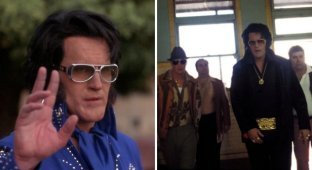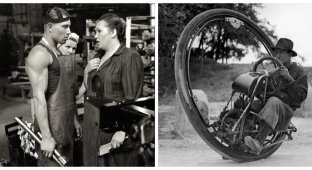Between black and white — 90 years since Elvis Presley's birth (25 photos)
Every decade, the pop culture pantheon is replenished with new deities. And although their merits are increasingly dubious, the glory of the pop idols of the past inevitably fades with time. And yet, there are still a few figures from the past who are doing just as well today as Taylor Swift: they continue to be listened to, watched, copied, idolized, and even criticized, just like in the long-gone days of their youth. 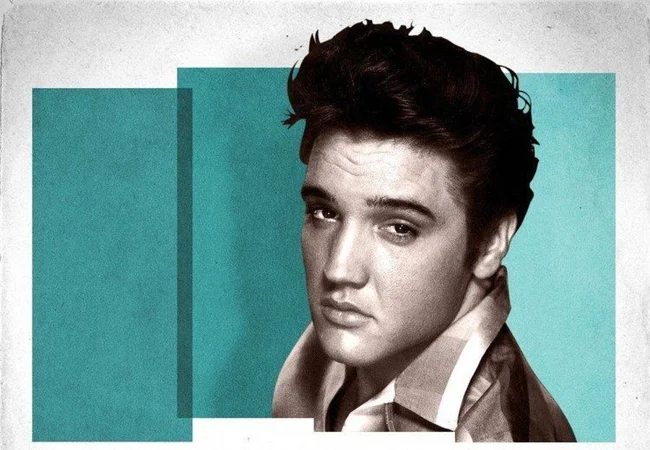
One of these figures is the king of rock and roll Elvis Presley, whose 90th birthday the world celebrated on January 8.
It's Not All Right, Mama
"The King and Queen of America" - this is how the Eurythmics once sang about Elvis and Marilyn Monroe - and this formulation is still relevant. No matter what new waves of fashion cover the North American continent, the power of Presley and Monroe there is indisputable. But at one time Elvis and his musicians were afraid that America would lynch them - these songs were too "Negro" for that time.
Today, 70 years later, the wind is blowing in the opposite direction, and Elvis is being scolded for cultural appropriation: he took, they say, the achievements of black music and appropriated them for himself, and at the same time for the entire white majority. These critics do not even remember what the world was like 30 years ago; how could they know that in Presley's youth, if a white American hung out in the black neighborhoods of a southern city - and Elvis loved to do just that - they could easily be taken into police custody so as not to stir up trouble and violate the rules of racial segregation. And if he started playing black music, it generally looked like an attack on the foundations of everyday life and morality. How did Elvis end up a revolutionary, given that as a child he was a quiet mama's boy? 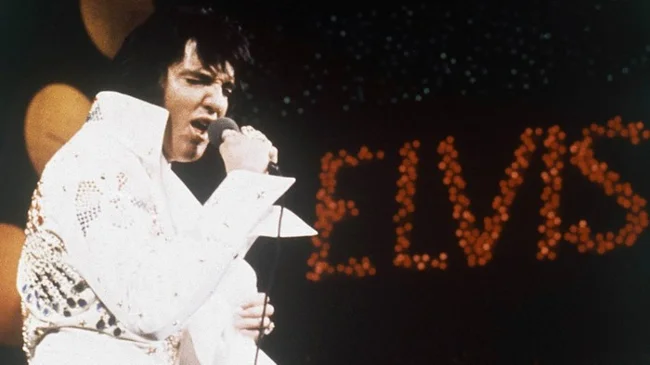
Today, psychologists use the term "maternal overprotection" - this is exactly what our hero experienced, and on a scale close to catastrophic. He was the only child of Gladys Love and Vernon Presley. The parents were expecting twins, but Elvis' older brother was born dead. This had such an effect on Gladys, an impressionable and anxious woman, that she decided to protect her son from any dangers, while not forgetting to regularly remind him of his older brother, who, having died, allegedly passed on his powers to Elvis, so he must certainly grow up to be something special.
Dad behind bars
But little Presley had no special features, except that his peers considered him a brat, since his mother practically isolated him from the outside world and strictly controlled who he was friends with, if he was friends at all.
With such an upbringing, Elvis risked growing up a completely helpless person. But this did not happen, largely due to the fact that the Presleys were not rich people who could use money to protect themselves from life's hardships, but people of very modest incomes, forced to struggle daily for existence. 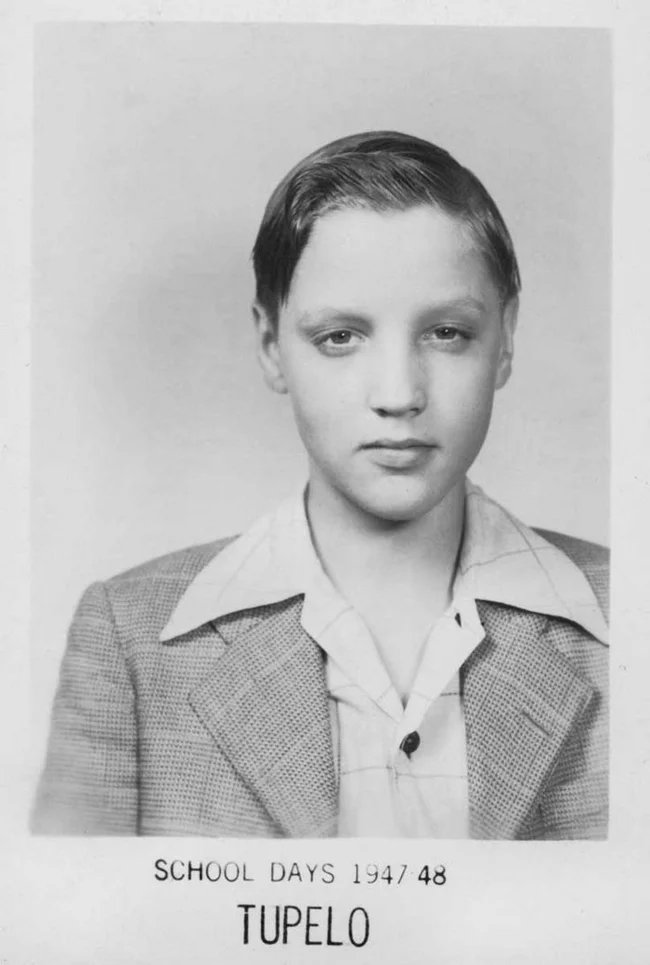
They lived in the town of Tupelo, Mississippi, later celebrated in a song by John Lee Hooker. Presley's parents were quite typical devout southerners, and Vernon even sometimes preached in a Pentecostal church. So when one not-so-fine day he was sent to prison for forging a check, it dealt such a heavy blow to his reputation that Gladys and her son had to move to another place, just to avoid looking into the eyes of their neighbors.
Vernon was not a hardened swindler, he just once, having found himself in another desperate situation, altered a check, turning one dollar into 40.
First chords
Financial difficulties became the reason that young Elvis got a guitar. If Gladys had enough money, she would have bought her son a bicycle, which he dreamed of, but she had to limit herself to a musical instrument that cost half as much. 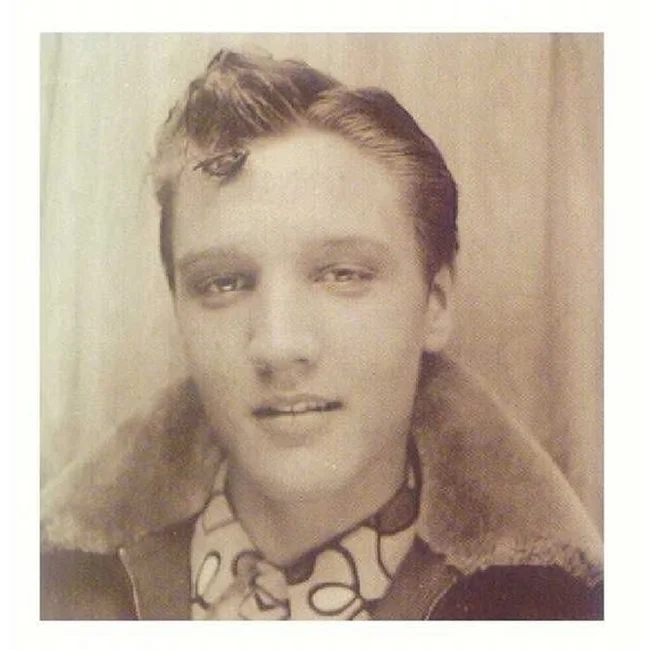
The local church pastor showed the young man his first chords, and soon Elvis was confidently accompanying the choir at church services, although he was still shy about singing in public.
Presley loved country music, and his hero was the singer Mississippi Slim, who hosted his own radio show. By a happy coincidence, Slim's younger brother studied in the same class with Elvis, and after a while Presley was already taking guitar lessons from his idol. 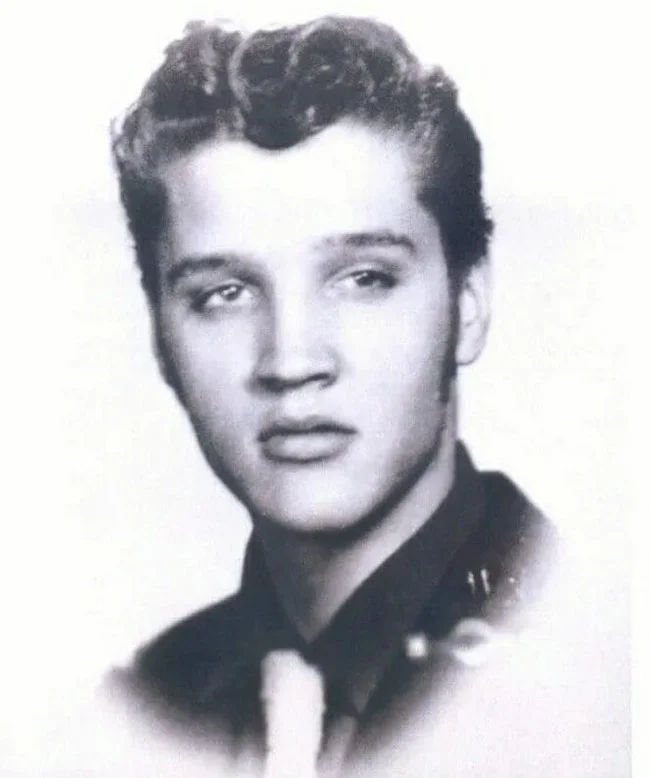
Although Elvis' biographers sometimes write that in his youth he did not shine with musical abilities, there was obviously something interesting about him that gave Slim the idea to invite the 12-year-old to his show. On the appointed day, Presley did not show up at the studio - he stayed home out of shyness. But a week later he finally plucked up his courage and performed.
In the black neighborhoods
After this artistic debut, Elvis became a little bolder, so when his family moved to Memphis, Tennessee, and at his new school the teacher gave him a C in music, Elvis ran home for a guitar and, returning, tried to knock him down with the fashionable song of that season by Pee Wee King, Keep Them Cold Icy Fingers Off Me. There is already a certain audacity in this act.
Memphis made a timid provincial into a noble dandy. After the small towns where the Presleys had previously roamed, Memphis seemed to Elvis almost like the capital of the world. He liked the black neighborhoods most of all, where music was heard everywhere - rough rhythm and blues or spiritual gospel, and the public on the streets competed in the brightness of their suits and the stylishness of their hairstyles. 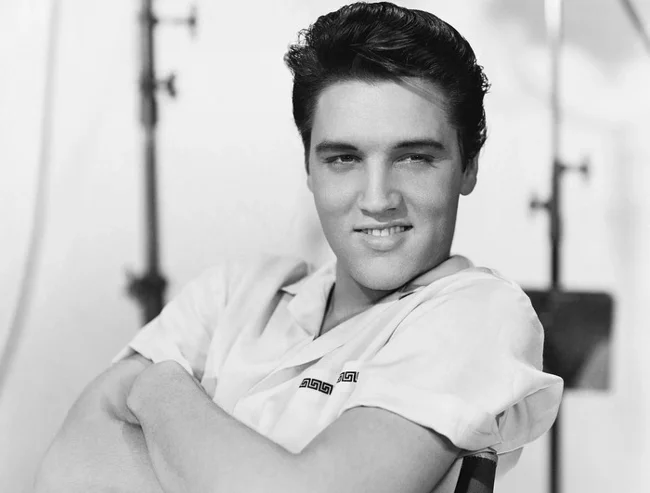
Presley also bought clothes there, for example, pink suits, almost unthinkable at that time for a white American, and began to grow his hair, styling it back with brilliantine, in imitation of black fashionistas. At school, where almost everyone wore a half-box, Presley looked like a real parrot.
But even more than that, Elvis – without abandoning his passion for country – loved listening to the music that sounded on Beale Street, the main street of the black part of Memphis. The famous blues guitarist B.B. King recalled that in those years he often met him there. 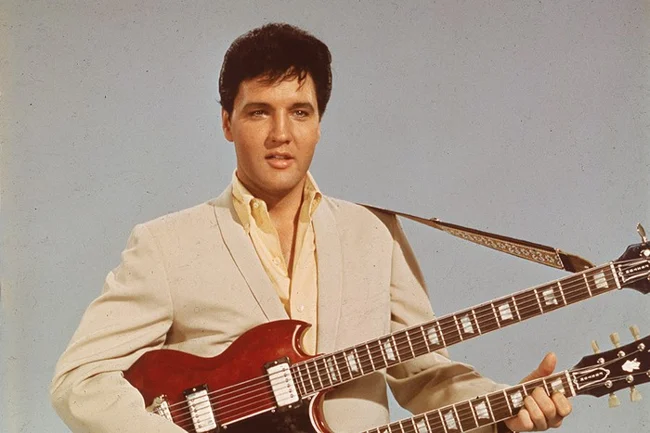
A Radio Host's Dream
After finishing school, Elvis got a job as a worker in a shell factory, but soon found a more fun job – a truck driver. This profession was clearly not the limit of his dreams, so he regularly went to auditions for different bands, but all without success.
In the late summer of 1953, Presley booked some time at the Memphis Recording Service studio to record, as he told the receptionist, a ballad as a birthday present for his mother.
In fact, Gladys's birthday was in April, and Elvis most likely wanted to check how he sounded on the record. Having picked up the finished disc, he went to listen to it at a friend's house, and judging by the fact that he never looked at this record again, having forgotten it at his friend's, he did not like the result. 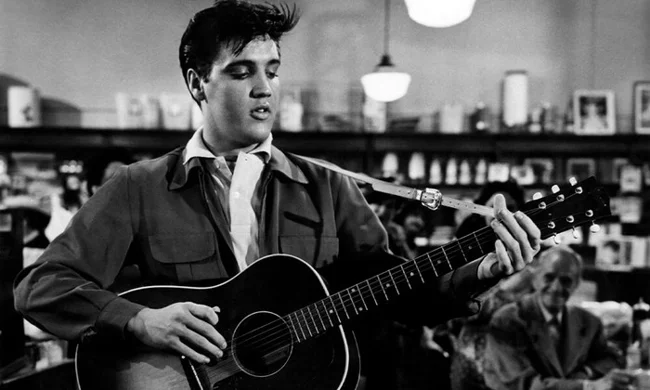
Six months later, there was a second attempt at recording - and again nothing interesting. But the young man's clumsy efforts caught the attention of studio owner and radio host Sam Phillips, who also owned a small record label called Sun Records. Phillips planned to turn it into a big one, using the powerful potential of rhythm and blues, which was heard everywhere in Memphis, while remaining black music.
Black musicians' records were mostly bought by their fellow tribesmen, with the exception of rare white enthusiasts like Elvis. But Phillips understood that the audience for this genre could be significantly expanded if you found a suitable white performer. This is roughly how America became addicted to jazz in the 1920s and 1930s: at first, the white majority avoided black orchestras, but when whites began playing jazz, it instantly became the music of the era. 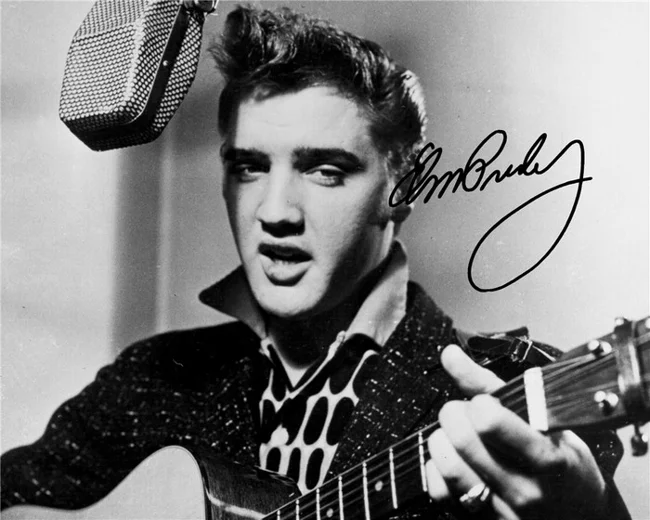
That Guy
Phillips saw a gap in popular music for young people in America. "There were nursery rhymes, and the over-25 crowd listened to jazz. But there was nothing for the five- to 25-year-old crowd," he recalled.
Finding a young white singer who could understand and play blues and R&B well was difficult. If a performer took on the job who didn't understand the specifics of black music, it all turned into a meaningless clown show. Sam Phillips was sad.
But until a white genius was found, he did not sit idly by and released what he could, for example, lyrical ballads. Elvis Presley seemed to him to be someone who, perhaps, if he could find good material and musicians, could have success with these very ballads and become something like a "southern Sinatra". 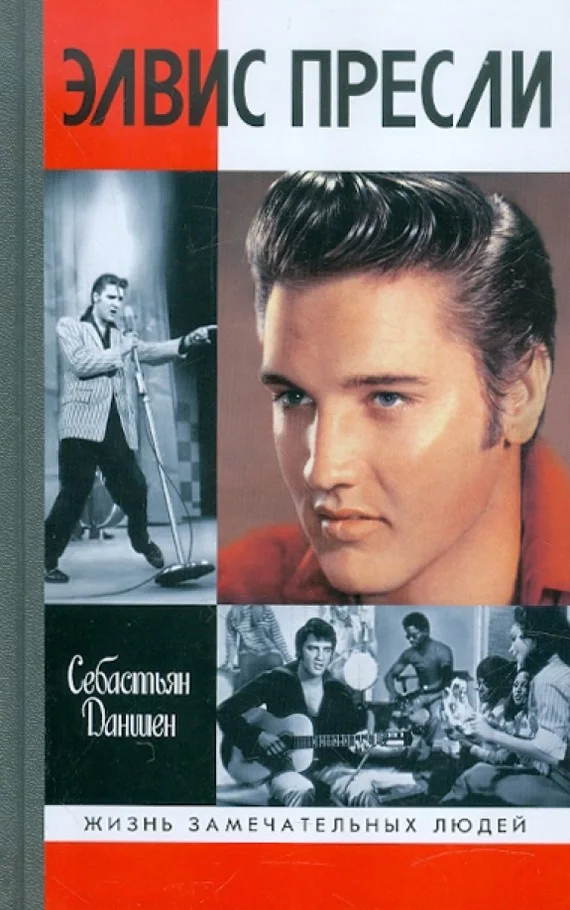
Phillips arranged a trial recording session for the singing truck driver with two accompanists - guitarist Scotty Moore and double bassist Bill Black. The session was sluggish, the driver did not shine, and Phillips gave the musicians a sign to pack up their fishing rods.
Realizing that the matter was over, Presley, for fun and to lighten the mood, began to play "That's All Right," an R&B number by Arthur Crudup. Moore and Black picked up the tune, and Phillips couldn't believe his ears: it seemed he had found what he had been looking for. Elvis played the song with a fire and a "twist" that only black artists were capable of. 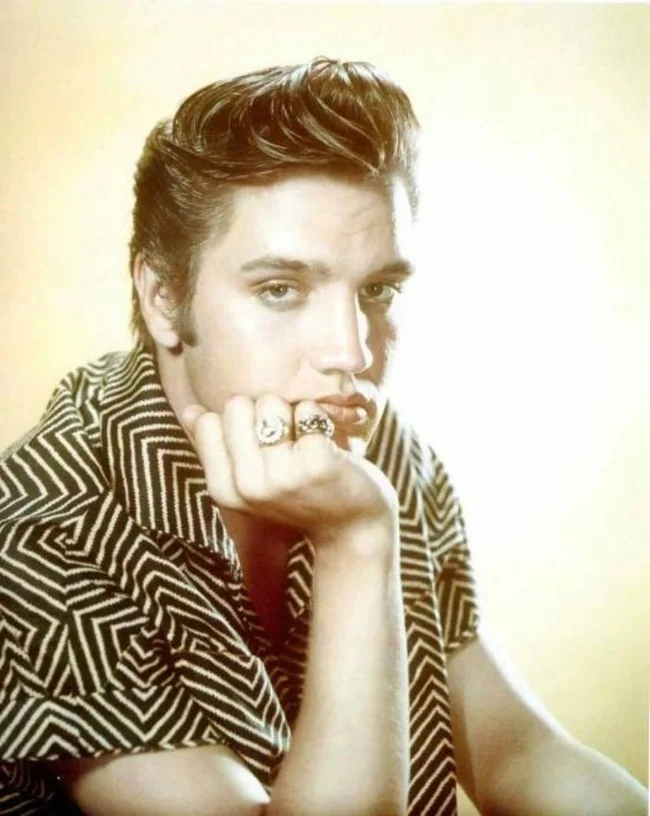
When "That's All Right" was played on Memphis radio a couple of days later, listeners couldn't believe that a white guy was singing it. For a while, this was even a problem – country radio stations wouldn’t play Elvis’s songs because they were “too black,” while rhythm and blues stations wouldn’t play Presley because he was “too country.”
Southern Gothic
Phillips wasn’t the only one dreaming of a new music for American youth. The idea was in the air: four months before That’s All Right, another white musician, Bill Haley, recorded the song Rock Around The Clock with The Comets, but it wasn’t released until 1955. Thus, rock and roll was born in the mid-1950s from white reworkings of black blues with boogie-woogie and from energetic songs by blacks themselves – Little Richard, Chuck Berry.
Legendary Motörhead frontman Lemmy Kilmister liked to repeat to young journalists who interviewed him: "You didn't live in a time before rock 'n' roll. I did. And it was a terrible void!" 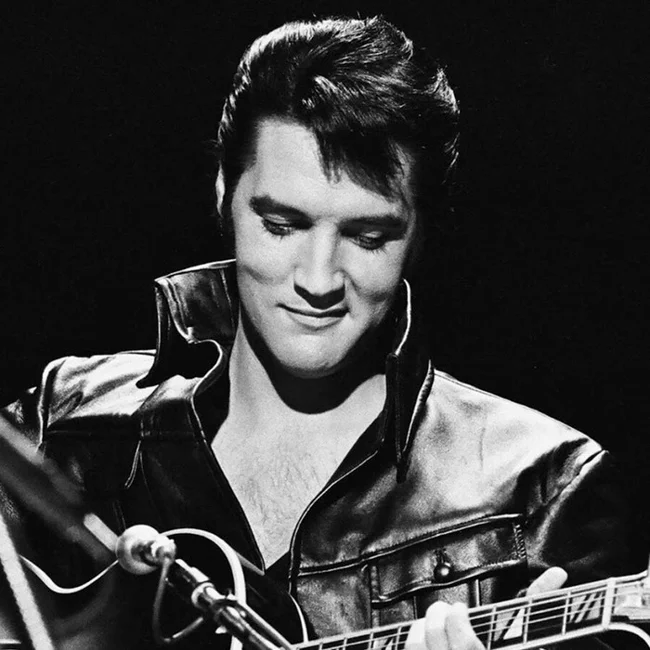
Rock 'n' roll "happened" to be born in the American South, where the reaction to it from the adult majority was extremely militant. If this style had appeared in democratic New York, there would have been no heated debates, protest demonstrations or burning of records at the stake, but sophisticated jazz reigned in New York at the time. Whether rock 'n' roll could have been born there at all is a big question. Most likely, this music was brought to life by the tense, contradictory atmosphere of the South with its racial segregation, ambiguity, white puritanism and African sensuality, threat and aggression hidden under the mask of lazy relaxation (well described in the plays of Tennessee Williams).
And all this tension of the South was in the young Elvis, an outwardly even and calm guy, yesterday's mama's boy, who gradually learned to stand out from those around him and became a walking reference book on local music - from hillbilly and white southern gospel to dirty blues. And who, when their trio with Moore and Black began to give their first concerts in Memphis, began to throw such antics on stage that friends only wondered where it came from in him. 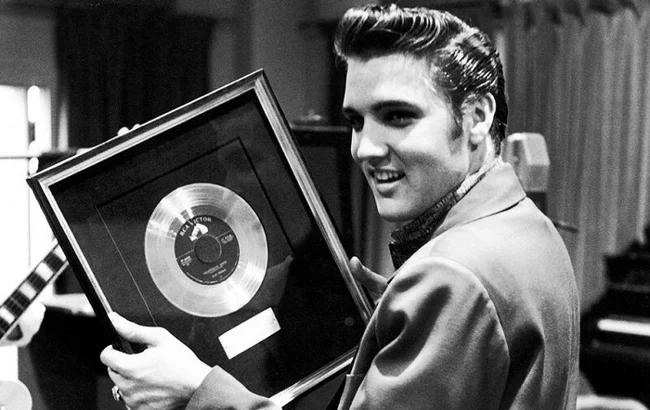
And it came from watching dances in the most seedy dives of Beale Street. While performing, Presley tried out certain movements, watching how the audience reacted to them. This is how his signature "hip wiggles" and other techniques appeared, which, according to the Puritans, he corrupted the audience.
Making Friends with Enemies
"We're going to be lynched," Scotty Moore muttered, half-jokingly, half-seriously, before their trio's early performances. The prospect was this: the fundamentalists were ready to hang Elvis from the nearest pole, and the young fans - to tear him to pieces. The latter almost happened after one of Presley's first stadium concerts, after which he had the imprudence to joke, addressing the audience: "I'm waiting for you in my dressing room!" The crowd took the invitation literally; the singer himself was then rescued, but his car was dismantled for parts.
Just recently, we would have had to strain our imaginations to imagine the indignation that Elvis caused in America with his appearance, because the world, it seemed, had changed a lot since then, had seen a lot and had become more tolerant. 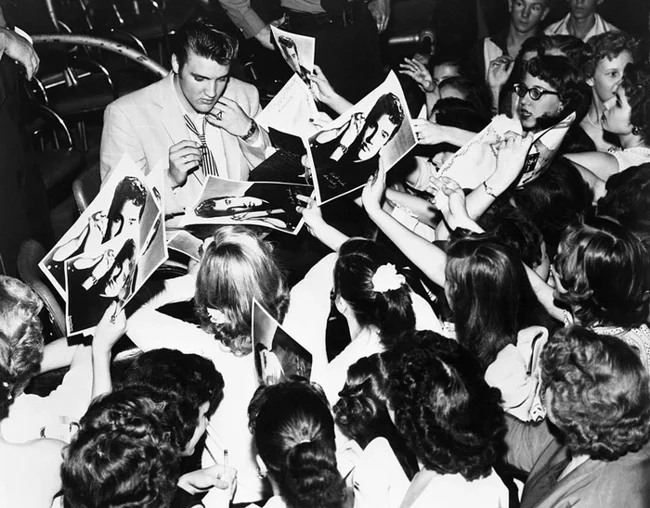
Colonel Tom Parker, who became the singer's manager in 1955, quickly realized that his client had to transform from a teen idol and an enemy of their parents into a figure that everyone loved. You can make money on the generation gap, but in that case, only the youth would pay for the music. The Colonel wanted all of America to fork out. 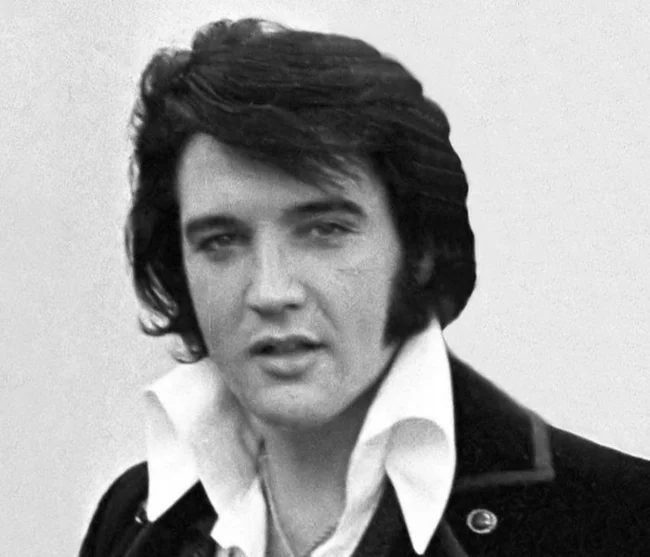
So following the super hits Heartbreak Hotel, Hound Dog, Blue Suede Shoes in 1957, Elvis' Christmas Album appeared - a collection of Christmas songs.
This disc was not so much an apology, but rather a reconciliation of Presley with the conservative part of society. And not only that.
Already on Elvis's first albums there were combinations of genres, and later it became obvious that Presley was good at almost everything: crooning (heartfelt performance of ballads and sweet lyrical songs), and gospel (spiritual songs), and the monumental pop music of the late period. 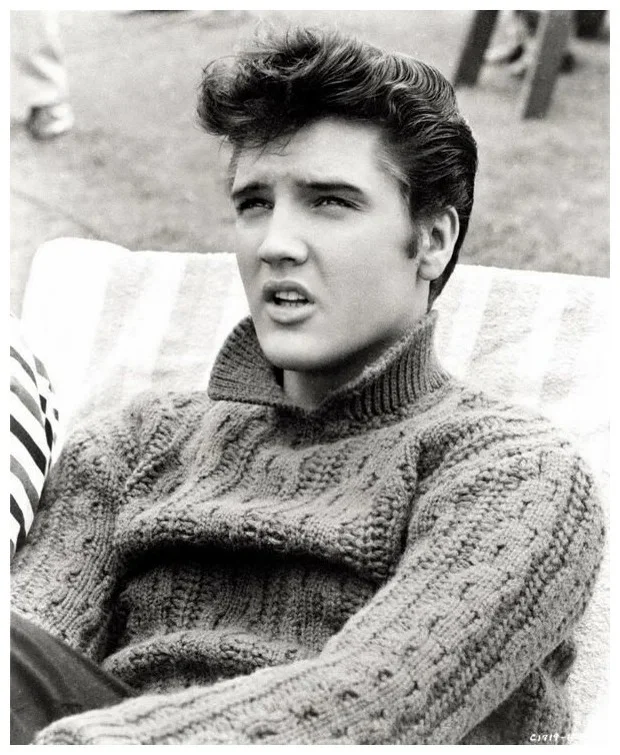
"A soldier walks through the city"
Another important PR campaign on the way to national popularity was Elvis's service in the army, which began in 1958, at the very peak of his fame. In a country where the ability to make money is one of the main virtues, it is unlikely that anyone would be very indignant that Presley avoided the draft, because he did it for a good reason: to hit the jackpot. But this was a great strategic move by Colonel Parker, who immediately shut the mouths of all conservative critics and showed that Elvis was not a spoiled scumbag, but a good American guy. At Parker's insistence, Presley was enlisted as a simple soldier.
Although the King of Rock and Roll's army days were regularly covered in the press, he himself did not really believe in the Colonel's strategy and was afraid that the public would forget him during his service. But Parker's team thought of everything, making a stock of studio recordings, and for these two years Elvis's records were released as regularly as if he recorded them in the evenings in the barracks. 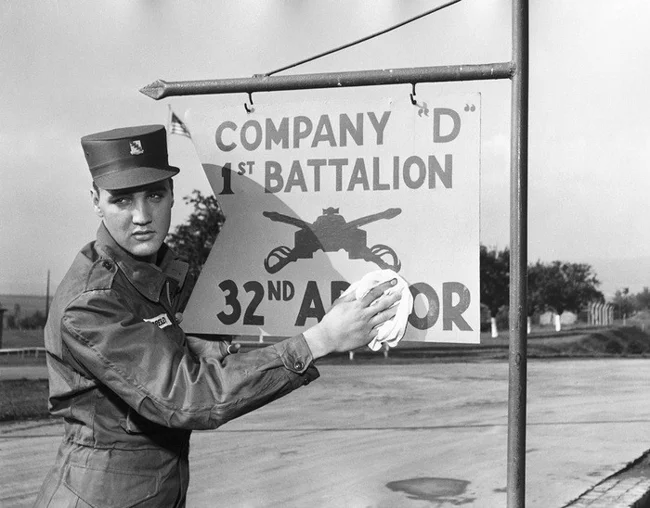
Presley during his military service at an American base in Germany, January 1, 1958
After six months of service, Presley received news that his mother was dying. Elvis managed to find her alive, but soon 46-year-old Gladys Love died. This was a heavy blow for the singer, which led him, as many believe, to drug addiction. In the army, his fellow soldiers introduced the sad Elvis to amphetamines, "for cheerfulness", and from then on they, and then barbiturates, "to calm down", became part of his life. Elvis did not like alcohol and drunk people.
Bad movie
After demobilization, it became clear that the cunning Colonel had not miscalculated: yesterday's troublemaker and "corrupter of youth" was greeted as a national hero. Soon the hero was already performing on TV in the Frank Sinatra show, who had previously given the following description of Elvis's rock and roll: "It causes almost entirely negative and destructive reactions in young people. It smells of falsehood. It is sung, played and written for the most part by cretinous thugs."
This, however, was where the strategic foresight of the Colonel who managed Elvis ended. Having rightly noted that the public now needed to be sold a "grown-up Presley," he decided that the best packaging for this product would be the genre of musical comedy and melodrama. In the short term, this did indeed bring in a good profit, but if you look at it more broadly, those three dozen films that Elvis obediently, but often against his will, churned out in the 1960s almost destroyed his career. 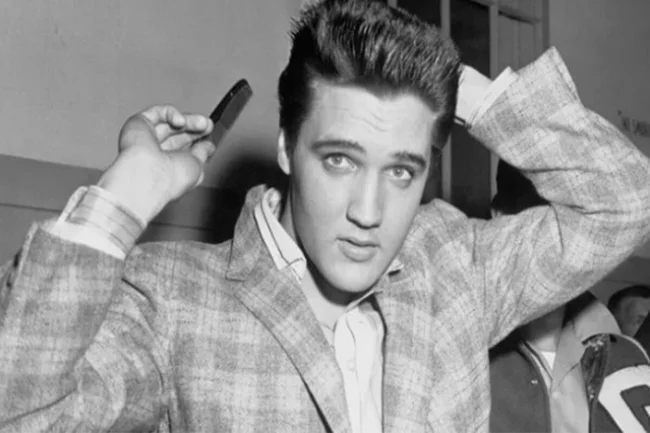
He was not averse to acting in films, but he leaned toward more serious projects, such as Don Siegel's western "Blazing Star" (1960). However, comedies brought in more money, and the Colonel insisted. As a result, Elvis' filmography was called "a pantheon of bad taste."
Things were not so good with the music either. Elvis himself never wrote it, and, bogged down in contracts, he lost the opportunity to choose it according to his taste, as in his early years. Sometimes he frankly didn't like the material he had to work with in the 1960s - usually songs from those silly films he starred in. He almost never gave concerts during that decade. 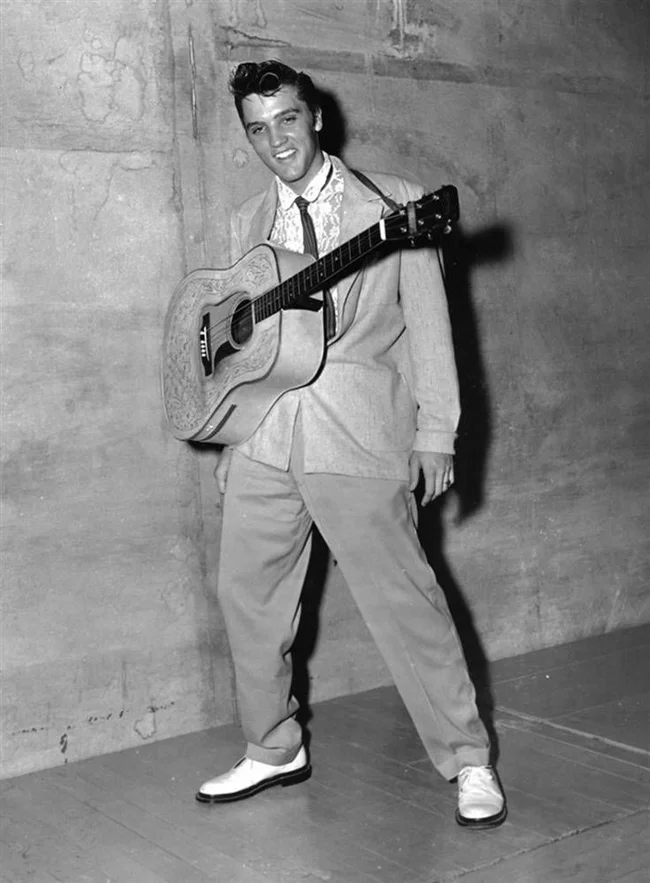
And it all started out so well: soon after his "demobilization" in 1960, the wonderful albums Elvis Is Back! and the gospel collection His Hand In Mine were released.
Back in Leather
During the turbulent years of the pop-cultural revolution of the 1960s, yesterday's rebel Presley was not on its "barricades". On the contrary, it would be more correct to say that he joined the conservative strata of society, sharing Sinatra's dislike of "unkempt hippies." He greeted the "Beatles" who arrived from Great Britain and wanted to meet their idol with restraint. A few years later, at a reception with President Nixon, Presley would say: "The Beatles are a concentrate of anti-Americanism."
The best thing Elvis could have done to greet the wave of new rock and roll was the album of spiritual songs How Great Thou Art (1967). Gospel music always helped him out: both when he needed to show that he was not a brainless brat, and when there was no decent composer nearby. Being a deeply religious person, Elvis put not only his singing talent into these songs, but also his whole soul - that's why they are so good. 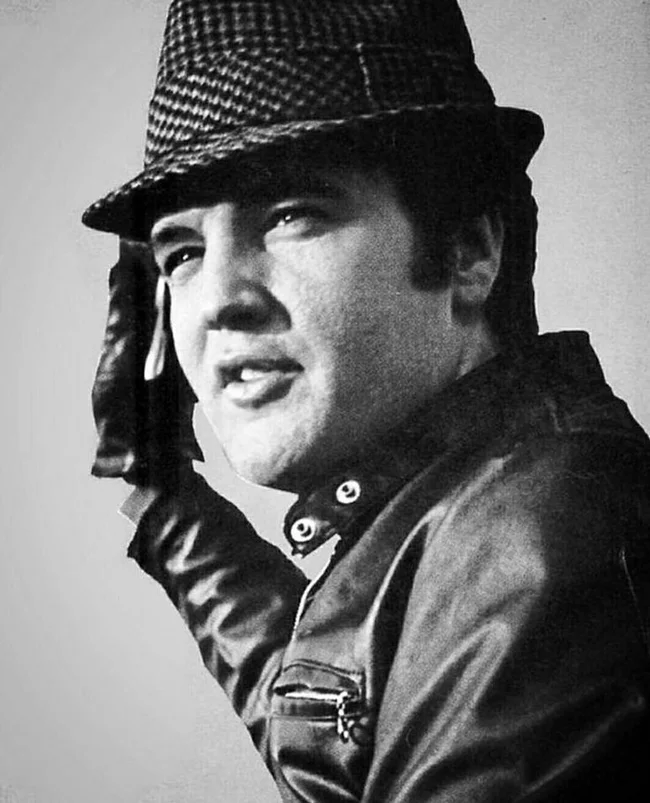
But the 30-year-old king of rock and roll was not going to completely immerse himself in spiritual creativity and in the late 1960s he was desperately looking for a way out of the crisis. In December 1968, it began to seem that he had succeeded.
The hour-long NBC televised concert (now known as the '68 Comeback Special) was Elvis's first performance in seven years. Dressed in black leather, the singer looked as daring as he had in his prime. Journalists wrote that Jim Morrison should be green with envy and that the lost Elvis had finally found his way home, "out of jail."
After the show, the singer said that it was the best thing he had ever done in his life. "I'll never sing a song I don't believe in again," he said. 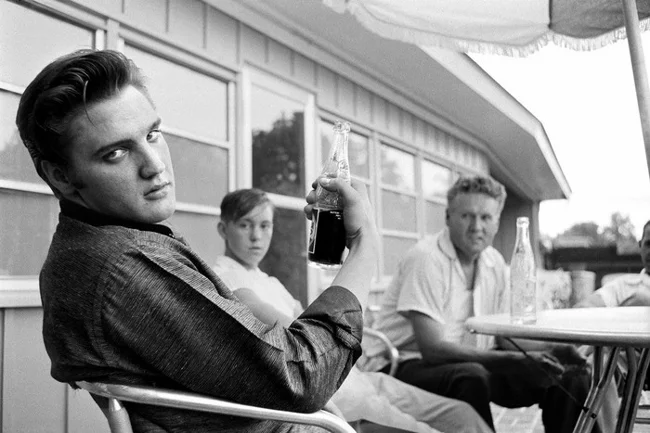
The album recording of this concert was a success, although it did not reach number one on the charts, as in the past. But the NBC show received the highest viewership rating.
Federal Agent
Developing his achievements, Presley released the album From Elvis in Memphis (1969), which, as critics wrote, caught up with all the popular music trends that had passed him by in previous years. Life was getting better - Elvis and his wife Priscilla, whom he met during his army years, were raising their daughter Lisa Marie, who was born in early 1968.
Presley began to actively perform again, and finally had the long-awaited number one hit - the song Suspicious Minds (1969). This luck was especially sweet after almost 10 years of wandering in the dark. Once again feeling like a significant figure, Elvis took on, no more and no less, saving the health of the nation. 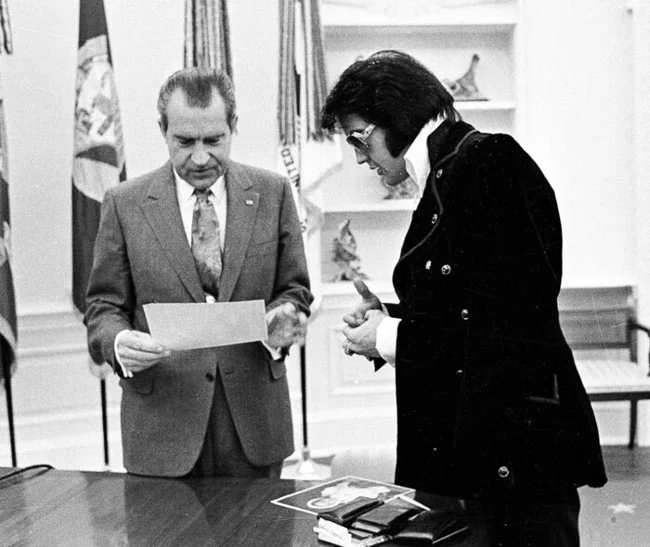
First he wrote a letter to President Richard Nixon. And in December 1970 he got an audience at the White House, where he repeated what he had stated in the letter. In Elvis's opinion, America's youth were abusing drugs, and he could help wean them off this infection - both as a big rock star, respected even by hippies, and as a federal agent of the Bureau of Narcotics and Dangerous Drugs (BNDD), if he were appointed as such. And he was very insistent on the appointment.
Nixon was clearly embarrassed by this conversation, well covered by the press. Communicating with rock stars was not easy for him: when the "godfather of funk" James Brown, another pop culture conservative, approached Nixon, the 37th president also did not know what to do. He did not want to be one of these people and only squeezed out Presley's wish to "protect his authority."
As it turned out later, Elvis was driven not by concern for the health of young people, but by his own safety. He collected insignia of various law enforcement agencies to show them off in emergency situations. And the badge of an agent of the anti-drug bureau gave very broad powers, at least that's what Presley thought. His wife Priscilla wrote in her memoirs: "The badge of a drug enforcement agent represented some kind of supreme power for him. Elvis thought that with it he could legally enter any country, carrying a gun and any drugs he wanted."
Latest Records
Elvis received the badge, although it is unknown whether he ever used it. What the badge definitely could not help the artist with was his own drug addiction, which was constantly getting worse. 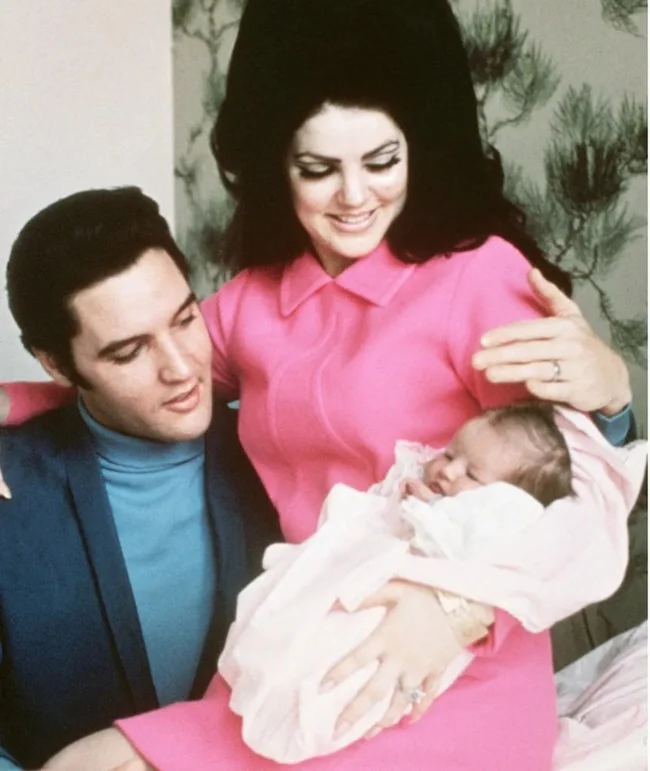
In 1973, his marriage with Priscilla broke up. Elvis allowed himself to cheat on his wife, but the divorce, according to friends, was a blow from which he never recovered for the rest of his life. Priscilla, however, claimed that after the breakup they remained good friends.
Elvis began to change women often, stopped limiting himself in drugs, because of which he ended up in a coma several times. He was also gaining weight and showing signs of developing paranoia. Fortunately, his accumulated merits lasted for several years, and he no longer had to prove his status as the king of rock and roll.
In 1973, Elvis became the first artist to have a solo concert broadcast via satellite around the world. It was called Aloha From Hawaii and was intended to raise funds for the Kui Lee Cancer Foundation. According to Colonel Parker, the concert was watched by about a billion people in America, Europe and Asia. The album of the same name became Elvis's last record to reach number one on the American charts.
During this period, Presley adopted the image that is most often parodied: embroidered suits with capes, which were a kind of compromise between hippie fashion and the pretentious outfits of country musicians from Nashville.
Down, then up
In his last year of life, journalists called Elvis a caricature of himself, an artist who had lost not only his good looks but also his voice. On August 1, 1977, the book Elvis: What Happened? was published - an investigation into the artist's drug-induced decline, based on the testimonies of his former bodyguards. Elvis tried in vain to prevent its publication. Presley's last single during his lifetime was eloquently titled: Way Down. 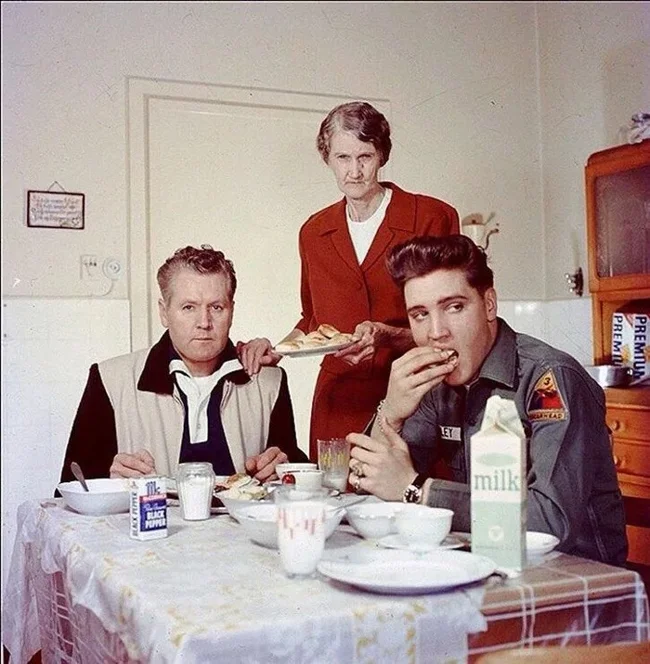
On August 16, Elvis was found unconscious on the bathroom floor of his Graceland mansion outside Memphis. The singer was taken to the hospital, but they were unable to revive him. Doctors pronounced the 42-year-old star dead, whose body seemed to have been completely destroyed by the drugs he wanted to save America from.
It later turned out that it wasn't just the "substances" that were to blame: Elvis suffered from a whole host of genetic diseases inherited from his mother, who also died early. In his situation, he should have been taking good care of his health, but he did the opposite.
"The King is gone, but he's not forgotten," Neil Young sang shortly after the funeral in one of his most famous songs, Hey Hey, My My (Into the Black). What seemed like a good wish for posterity in the late 1970s eventually turned out to be true. Elvis is as far from oblivion as Mozart, Pushkin, or Picasso. 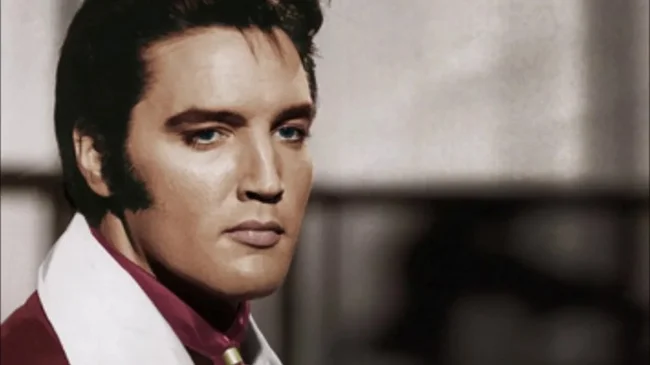
But he didn't write songs, didn't say smart words, and didn't even give a normal interview in his entire life. Of course, he was one of the pioneers of rock 'n' roll, but neither his merits to this genre nor his magical voice seem to be a sufficient explanation for the fame that surrounds Elvis's name. As in the case of Marilyn Monroe, it was as if some higher power attracted the attention of millions and appointed him king, bypassing many seemingly reasonable arguments. And is there any point in contradicting this power?












